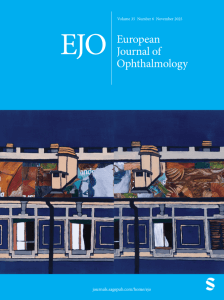Italian Study Highlights the Potential of AvDesk in Neuro-Visual Assessment in Patients with Geographic Atrophy
A clinical study published in the European Journal of Ophthalmology suggests that the use of AvDesk may improve certain visual acuity parameters and support quality of life in patients with geographic atrophy.
A new clinical study1, published in the European Journal of Ophthalmology, evaluated the effectiveness of neuro-visual training with AvDesk, a Class I CE-marked medical device developed by Linari Medical, in patients with geographic atrophy (GA) secondary to age-related macular degeneration (AMD).
AvDesk is based on a non-invasive neuro-visual training approach that can be used both in clinical settings and at home, an aspect that is particularly relevant for older patients or those with advanced ocular conditions.
The Disease: A Growing Concern
Age-related macular degeneration (AMD) is the leading cause of severe vision loss among older adults in industrialized countries2. It affects the macula, the central part of the retina responsible for clear, detailed vision
The atrophic form, also known as geographic atrophy, represents about 35% of advanced AMD cases3, leading to a progressive and irreversible loss of central vision:
- In Italy, it is estimated that over 1 million people live with AMDD4
- In Europe, the number is around 5 million5
- Globally, estimated cases exceed 196 million6
At present, there are no definitive treatments for geographic atrophy. Drug options are very limited, making visual rehabilitation one of the few ways to help patients maintain their independence and quality of life.
The Pilot Study
The study, led by Italian doctors Maurizio Battaglia Parodi, Francesco Bandello, Sebastiano Del Fabbro, and colleagues, involved a small sample of 17 patients with geographic atrophy secondary to AMD, focusing on the eye with better visual acuity.
The AvDesk neuro-visual training protocol, which is entirely non-invasive, consisted of:
- Twice-weekly sessions for three consecutive weeks
- Pre- and post-training assessments using standardized ophthalmic examinations
- Measurements with the MAIA microperimeter to evaluate fixation stability (BCEA, 63% and 95% bivariate contour ellipse) and macular sensitivity (MS)
- NEI-VFQ 25 questionnaire to assess clinical response and patient-reported quality of life
Study Results
After the AvDesk rehabilitation cycle, participants showed:
- Significant improvement in best-corrected visual acuity (BCVA) by 29.1%, from 0.55 (SD 0.28) to 0.39 (SD 0.26) LogMAR (p = 0.0002), equivalent to approximately two additional lines on the ETDRS chart
- Increase in fixation stability and macular sensitivity
- Improvement in NEI-VFQ 25 score, from 55.05 to 62.18 (p < 0.01)
AvDesk showed promising results as a neuro-visual support tool, potentially contributing to improvements in visual acuity and quality of life in patients with geographic atrophy.
The pilot study assessed outcomes immediately after the training cycle; long-term data are not yet available.
This raises an important research question: how might patients benefit if this non-invasive treatment were applied during the earlier stages of the disease?
The implications could be significant and represent an important direction for future research.
Looking Ahead: Future Research Directions
This publication adds new evidence supporting Linari Medical’s work in neuro-visual research, showcasing the potential of a versatile, non-invasive technological approach that can benefit both vision professionals and their patients.
“We are proud that AvDesk has shown promising results in such a complex condition as geographic atrophy. We recognize that this is only a starting point, and we will continue to support research to provide increasingly effective solutions for patients. Furthermore, AvDesk allows us to meet a fundamental need: with a single device, we can support multiple neuro-visual conditions as well as cognitive and sports enhancement programs, opening up much broader applications beyond a single clinical condition.

Caterina Stimola
CEO & Co-Founder, Linari Medical
Request More Information
Enter your details, and we will provide you with more information on neuro-visual approaches applied to macular degeneration.
Bibliographic References
- Del Fabbro S, Jimenez B, Bianco L, et al. Neurovisual rehabilitation of patients with geographic atrophy secondary to age-related macular degeneration with AvDesk system. European Journal of Ophthalmology. 2025;0(0). doi:10.1177/11206721251349039
- Age-related macular degeneration - The International Agency for the Prevention of Blindness (IAPB)
- Rapid Developments in Geographic Atrophy - Ophthalmology Management
- Age-related macular degeneration currently affects 1 million Italian - Rare Diseases Observatory (italian web journal)
- Colijn, Johanna M et al. “Prevalence of Age-Related Macular Degeneration in Europe: The Past and the Future.” Ophthalmology vol. 124,12 (2017): 1753-1763. doi:10.1016/j.ophtha.2017.05.035
- Zhang, S., Ren, J., Chai, R. et al. Global burden of low vision and blindness due to age-related macular degeneration from 1990 to 2021 and projections for 2050. BMC Public Health 24, 3510 (2024). https://doi.org/10.1186/s12889-024-21047-x
This article is intended for healthcare professionals and is for informational purposes only. It does not replace medical advice and does not constitute advertising for the device. AvDesk is a CE-marked medical device for both clinical and home use.
